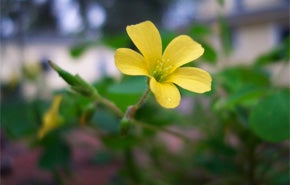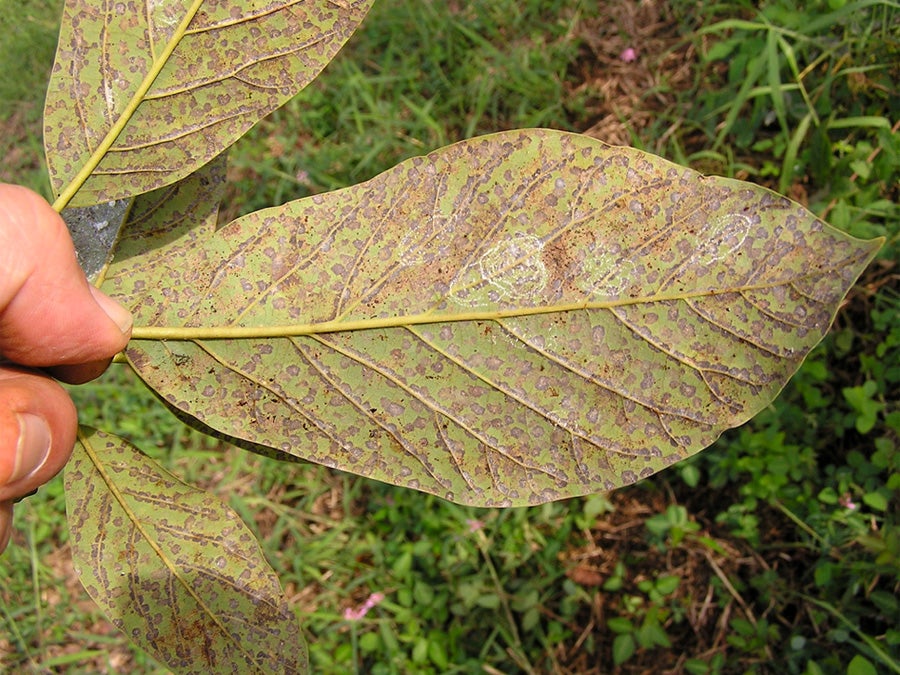All about cockscomb and celosia!
ListenMike explains how to get rid of weeds in the fall season, the hidden dangers in old apple orchards, why fruit trees should NOT be fertilized in the fall, and the many varieties of cockscomb and celosia. Plus: A special interview with pest control expert Ed Rosenthal.
Question of the Week:
Hi; can you tell me where I can buy the tall growing variety of cockscomb? Thank you!
— Colin from Hertfordshire, England
Learn about cockscomb varieties »
Highlights from show for October 12, 2013:
Getting rid of weeds in the fall season
Hannah from State College, Pennsylvania is trying to get rid of a yellow-flowering clover that she’s finding in the cracks of her stone walk and in her perennial flower bed. Her technique for ridding her walkway of clover — spraying with vinegar or pouring boiling water in the cracks — has been working, but she’s hesitant to apply the same tactics in her perennial flowerbed. Mike advises that she can try the vinegar spray or apply herbicidal soaps to the weed in her perennial bed as long as she has a helper standing by with a piece of cardboard to block her other plants from the spray. As long as she is controlling her herbicide correctly, it can be applied in her flowerbed. But Mike continues to explain that this is not the right season to be applying herbicides of any kind: “Herbicides are at their best on hot, dry sunny days. So this is the time to be pulling, planting, getting your supplies together and getting ready for next season … This time of year, pulling is the most effective. And then next summer, when we get into the long, hot sunny days, that’s when you can really toast these plants.”
“Herbicides are at their best on hot, dry sunny days. So this is the time to be pulling, planting, getting your supplies together and getting ready for next season.”
Mike McGrath
-

Photo by Flickr user Shelly T.
Hidden dangers in old apple orchards
Carol from Hunterdon County, New Jersey called in to follow up on a previous call about a man who purchased an old apple orchard. Carol was happy that Mike advised the orchard owner to have the soil tested because old apple orchards are notorious for contaminated soil. She then shared a story about her co-worker that got lead arsenic poisoning from eating morrel mushrooms that were growing in an orchard with a similar history, and she warns listeners that this is a surprisingly common problem that needs to be taken seriously. Mike agreed, saying: “I can’t tell you how bad I felt about that phone call. It was like the old Oscar Wilde line — the only way I would have felt worse is if I hadn’t told the guy that he potentially bought a real toxic waste problem.”
Special Interview: Ed Rosenthal
Pest expert Ed Rosenthal speaks with Mike about some of the natural ways you can deter unwanted pests in the garden, sharing tips from his new book Protect Your Garden. Mike’s first question for his Californian guest is what’s the biggest pest problem for gardeners on the west coast. Ed says that the biggest headache to California gardeners are mites of many varieties. Mike agrees that mites are a very tiny and destructive pest, but he finds it strangely common that this particular pest falls off the radar of many gardeners. Ed explains: “They’re very tiny, and they live under the leaf, on the underside of the leaf rather than the top. So you’re going to see the damage before you actually see the creature. And the damages [look like] a little brown spot with a ring of yellow around it.”
When Mike asks Ed what the best course of action is against a mite infestation, Ed explains that he finds natural remedies the most effective. Ed says: “Many of the spices and herbs that we use actually are protectants to plants. So for instance, cinnamon has cinnamaldehyde — and if you wanna see something really crazy, take a teaspoon of cinnamon powder and put it on an ant hill and see what happens. The ants go crazy trying to avoid it; they start carrying their eggs out of the hole, it’s incredible. You rarely see insects on oregano or rosemary or thyme, right? The reason is that they produce those odors. So a lot of the pest control that’s in this book is based on that fact.”
“This is the kind of book that we really need out there — a complete guide to identifying the insect pests in your garden, and then really strong explanations of the controls that are used against them, how to use them effectively, and [Ed Rosenthal] even includes beneficial insects in those controls. Ed Rosenthal’s Protect Your Garden shows you what’s eating your plants and then tells you how to stop them in a natural way.”
Mike McGrath
Don’t fertilize your fruit trees in the fall!
Bob from Oklahoma City, Oklahoma has a young pear tree whose leaves started turning upside down. Mike was aghast to learn that Bob applied a Miracle Grow fertilizer and scolds him not only for the use of chemical fertilizer, but for poor timing of his application. Mike explains: “One of the rules of any kind of fruit trees is for God’s sake never feed them past July. It’s actually safer to do all of your feeding in the spring. Because after they’ve produced their fruits and they’re ripening their fruits up, they’re using stored nutrition, they’re thinking about going dormant for the winter. And then you hit them not only with fertilizer but with chemical fertilizer that they have no choice — if they’re growing in rich soil they can take what want and leave the rest behind, but you’re like injecting them with steroids when you do that Miracle Grow. And that gave them a burst of unnatural energy that caused a late growth spurt that has probably confused the tree.”
Growing broccoli from seed
Phyllis from Philadelphia, Pennsylvania has enjoyed growing amaryllis and caladium in pots in her backyard, but she’s not sure how to care for these plants through the winter. Mike explains that these plants are not especially cold-hardy and they need to be brought indoors to rest through the winter season. The bulbs should be stored in cardboard boxes in a dry place until frost has passed in the next season, when they can be replanted.
Storing bulbs through the winter
Peter from New Brunswick, New Jersey is having trouble growing broccoli. Mike suspects that either the broccoli seed that Peter was using was a variety that’s different than the bunches he’d buy in the grocery store, or the weather was not in his favor. Mike explains: “The heads of broccoli develop best in really cool weather. And you know, those plants can take a frost — they’re not bothered by frost whatsoever. So if you want to do this again, I might start the plants earlier, and then once they get to be about six weeks of age, I would put them out even if it was still really cold. Even if you were still gettin’ some light frost and some snow.”
WHYY is your source for fact-based, in-depth journalism and information. As a nonprofit organization, we rely on financial support from readers like you. Please give today.












